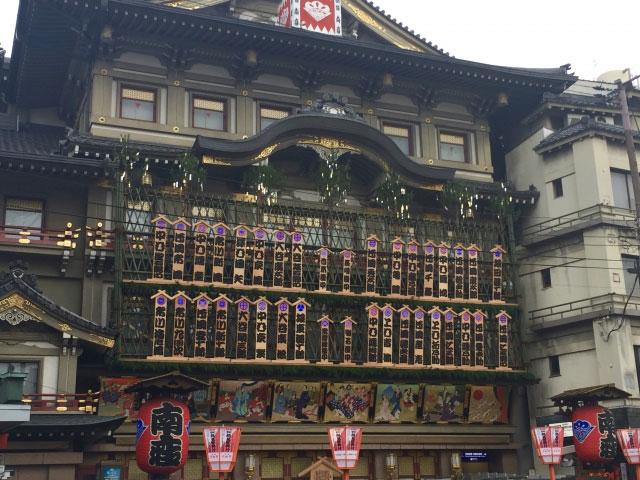News
June – Kabuki Updated in June 2018
Kabuki’s verb form in Japanese, “kabuku,” meant “to act in a disorderly manner, wearing outlandish costumes.” A once frowned upon or eyebrow-raising performance had turned into Japan’s most famous theatrical art, Kabuki. In early 17th century, a miko or shrine attendant formed an onna-kabuki or women’s kabuki troupe. Because of their rather sensuous dance movements, authorities banned women from performing and asked young male actors to do the acting. And adolescent boys played female roles, like in 16th century Shakespearean plays.
Although male actors took over female roles, authorities still feared that kabuki would cause social disorder. To persuade the authorities, actors pledged that they would not expose their bodies more than necessary. Since then, Kabuki theaters had flourished in major Japanese cities like Kyoto, Osaka, and Edo (present Tokyo) to stage stories ranging from historical epics to household dramas. Minamiza in Shijo, Kyoto for instance is the oldest kabuki theater still in operation since early 17th century.
An authentic full-version Kabuki performance include three acts, each lasting for about 60 minutes. It would take about 4-4.5 hours for the whole performance to complete. There is usually a 30-minute lunch break plus some shorter intermissions. If you opt for a more beginner-friendly act, you might enjoy “Discover Kabuki” which will be performed at the National Theater in Tokyo on Friday, June 15. The performance comes with multilingual earphone audio guides.
https://www.ntj.jac.go.jp/schedule/kokuritsu_l/2018/306discover-kabuki.html?lan=e
In autumn, almost all Kabuki theaters around Japan host an all-star show called “Kao-Mise,” or “Face-Showing.” The Kao-Mise used to introduce new actors who will perform throughout the coming season. Today, all actors including veterans appear on stage. The show will consist of famous scenes, dances, and some comedy. Kabuki tickets can be pricey, but if you book early, you may get Upper Tier seats around 3,000-5,000 yen. If you don’t mind queuing, single-act tickets (Makumi tickets) are even more reasonable at around 500-1,500 yen.
https://www.kabukiweb.net/
https://www.kabukiweb.net/news/2018/05/makumi_single_act_tickets_kabukiza_tokyo_may_2018.html








